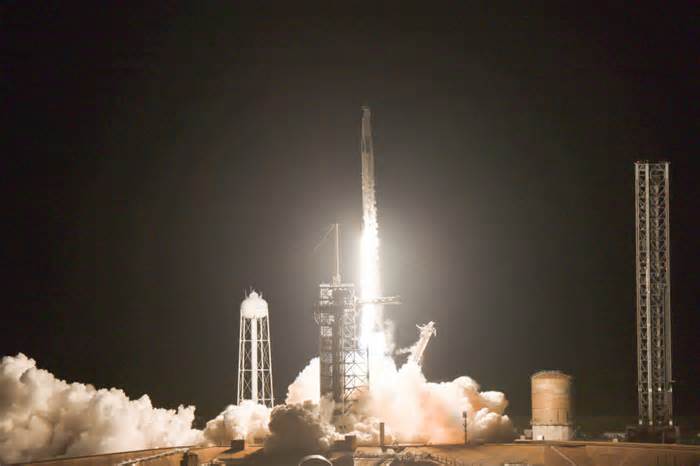
SpaceX president predicts rapid increase in Starship launch rate
- by Ars Technica
- Nov 18, 2024
- 0 Comments
- 0 Likes Flag 0 Of 5

Minimize to nav
As SpaceX made its final preparations for the sixth launch of its Starship rocket, the company's chief operating officer and president spoke at a financial conference on Friday about various topics, including the future of the massive rocket and the Starlink satellite system.
The Starship launch system is about to reach a tipping point, Gwynne Shotwell said, as it moves from an experimental rocket toward operational missions.
"We just passed 400 launches on Falcon, and I would not be surprised if we fly 400 Starship launches in the next four years," Shotwell said at the Baron Investment Conference in New York City. "We want to fly it a lot."
That lofty goal seems aspirational, not just because of the hardware challenges but also due to the ground systems (SpaceX currently has just one operational launch tower) as well as the difficulty of supplying that much liquid oxygen and methane for such a high flight rate. However, it's worth noting that SpaceX will launch Starship four times this year, twice the number of Falcon Heavy missions. An acceleration of Starship is highly likely.
Apart from founder Elon Musk, Gwynne Shotwell is now SpaceX's longest tenured employee. She joined the company just months after its founding in 2002 as vice president of sales. In 2008, she became president of the company and has led its operations since then. Although she is more diplomatic than Musk, her desire to disrupt the global spaceflight industry is no less intense. She relishes the fight, as her remarks at the business conference indicated.
Timeline for Starship to replace Dragon
Shotwell said SpaceX is planning to steadily replace its Falcon 9 and Falcon Heavy launches with Starship missions in the coming years. Even the last bastion of Falcon 9 flights—crewed missions on the Dragon spacecraft—will end sooner than people realize, she said.
"Starship obsoletes Falcon 9 and the Dragon capsule," she said. "Now, we are not shutting down Dragon, and we are not shutting down Falcon. We'll be flying that for six to eight more years, but ultimately, people are going to want to fly on Starship. It's bigger. It's more comfortable. It will be less expensive. And we will have flown it so many more times."
SpaceX continues to scale its operations to meet the demands of Starship and Starlink. Shotwell revealed that SpaceX now has 15,000 employees, which is about three times as many as the company had just six years ago.
The company will "make money" on Starlink this year, she added, as the constellation now has nearly 7,000 operational satellites in low-Earth orbit. The service is now available in 114 countries around the world and has about 120 to go.
SpaceX has also begun launching larger Starlink satellites capable of "direct-to-cell" service, and Shotwell said this service will be activated "in a month or so." It will initially support light data and messaging, but as the network grows larger, it will evolve to provide more robust data services.
SpaceX worth a quarter of a trillion dollars
As Starlink has come online, it has significantly increased the valuation of the privately held company. A decade ago, SpaceX was valued at about $12 billion, and this grew to $36 billion in 2020. Most recently, the company was valued at about $255 billion.
"The company is incredibly valuable I think, right now, because of Starlink," Shotwell said. "And I think Starlink will add a zero probably at least as we continue to grow the Starlink system. But ultimately, I think Starship will be the thing that takes us over the top as one of the most valuable companies. We can't even envision what Starship is going to do to humanity and humans' lives. And I think that will be the most valuable part of SpaceX."
Shotwell also addressed the challenges SpaceX has faced with the Federal Aviation Administration—Musk has been highly critical of the federal agency that regulates launch licenses in the United States.
She noted that the current regulations were written, and the FAA's commercial space office was staffed, to regulate companies that launch 10 or 12 times a year. Before the ascent of SpaceX, this was the norm in the US industry. But last year, SpaceX launched 96 times, and this year, it will exceed 130 even as it pushes to launch the experimental Starship system more frequently.
"We never complain about regulation," Shotwell said. "It's not that there is regulation. It's that regulation in the US—maybe globally, maybe not China—but maybe everywhere else is slowing technology down. It's not helping, it's slowing. All we ask is regulate industries, make them safe, make them right, make them fair, but you've got to go faster. Much faster."
Do you fear nationalization?
Shotwell also did not sound concerned about the prospect of nationalization. Some critics of Musk have called for nationalization due to his entanglement with the US government and international affairs.
"As far as nationalization goes, we work for the government in so many ways," Shotwell said, citing contracts with the US Department of Defense and NASA. "If we are in a conflict and the government needs Starlink, more capacity, we are not going to say, 'No, we'd rather have the country get overrun. Nah, we want to keep our customer base.' Like, it's just not going to happen. If the government needs it, the government will get what they need. Just like always, for us, despite news reports."
During her remarks, Shotwell also opined on other subjects, including competitors in launch and satellite broadband. She believes it will be more difficult for competitors to catch up in launch than in low-Earth orbit Internet. "It will be hard to catch us on launch," she said. "I think launch is harder than satellites. It's going to be hard to catch us, but I certainly hope people try."
Please first to comment
Related Post
Stay Connected
Tweets by elonmuskTo get the latest tweets please make sure you are logged in on X on this browser.
Sponsored
Popular Post
Tesla: Buy This Dip, Energy Growth And Margin Recovery Are Vastly Underappreciated
28 ViewsJul 29 ,2024






 Energy
Energy



















